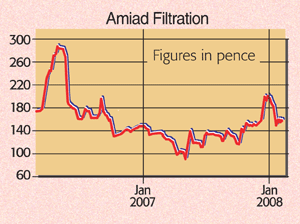
From Babylonia to ancient Egypt, most of the world’s great civilisations grew up on the banks of rivers. But in the 21st century, even the world’s great waterways can’t sustain the life that’s sprung up around them.
The Yangtze and Ganges have stopped flowing to the sea altogether as cities in their basins swell with migrants seeking the gains of explosive economic growth.
With global demand for water expected to double over the next 20 years, the UN expects that nearly 40% of the world will live in water-starved regions by 2025.
And so countries worldwide are embarking on vast water infrastructure projects to get a grip on this escalating humanitarian crisis. Developing nations are expected to spend up to £500bn on upgrading water systems in the next few decades, says Emma Howard Boyd of Jupiter Asset Management.
But it’s not just about laying pipes and sinking wells. Governments faced with no choice but to manage their existing water reserves are relying on sophisticated technology – investing in sewage control, desalination, water filtration and purification. Firms specialising in these water technologies will make it one of the hardest working sectors over the next few decades.
Middle Eastern governments have certainly woken up to the crisis. Stirred by the prospect of their desert metropolises running dry, the sheikhs of Abu Dabi and Dubai are ploughing petrodollars into extracting water from the surrounding seas. More than 60% of the world’s desalination plants are already dotted around the Gulf, with regional demand for desalinated water growing at an annual average of 6%. “Arab states will need to invest $100bn on desalination over the next decade if demand keeps growing at the same pace,” Sarah Woodbridge of IRR Middle East told Middle East business daily AME Info.
Recycling water is also catching on. Where once tenants in the shanty towns that surround Rio and Sao Paulo lugged water in buckets through the heaving slums, now the water is treated and piped to their homes from central water plants. The global market for water treatment is already worth around $50bn a year and is growing at 7%-8% annually.
Then there’s the agricultural industry. Fully two-thirds of all water used on the planet is for irrigation purposes. As usable farmland is lost to creeping desertification in countries such as China and Australia, irrigating arable land is becoming an increasingly demanding business. The OECD estimate that beef consumption in China and India, which relies heavily on water-intensive grain production, is set to rise by nearly a third by 2015. Those specialising in irrigation technology will certainly have a rich vein to tap in developing markets.
They’ll have to work fast, though – the water crisis is already stoking conflict across the globe. In Latin America, there are recurring stand-offs between farmers and the mining industry over water needed for irrigation. And Indian slums regularly erupt in riots as desperate slum dwellers crowd around a single water pipe. As Mark Twain once put it, “whiskey is for drinking, water is for fighting over”. We have a look at a company that is supplying state-of-the-art water technology to governments worldwide below.
Investing in water: the best stock in the sector
One company with a global reach in water treatment, which is also at the forefront of water technology, is Amiad Filtration Systems (AFS), say Robert Ansted and Mark Robinson in Investors Chronicle. Amiad is an Israeli firm, listed on Aim, which derives 90% of its revenue from sales of its water purification and irrigation systems in over sixty countries worldwide. Its products are used for purposes ranging from improving the quality of drinking water to recycling water in acquaculture industries and for car manufacturers.
Recent results have been very encouraging, coming in well ahead of analysts’ expectations, with a 27% increase in full year revenues for 2007. Amiad Filtration Systems is benefiting from the huge global investment in waste water, desalination and irrigation from biofuel plantations. Europe, America and Australia were the strongest regions for sales growth, with Asia-Pacific not far behind.
The company also announced that it entered 2008 with an order backlog substantially higher than it had at the same time last year. Gross profit margins came in at 49% a year ago. The weak dollar and rising costs of raw materials may have some impact on this, but the stock remains cheaply rated, on a forward p/e of 9.5 for 2009.